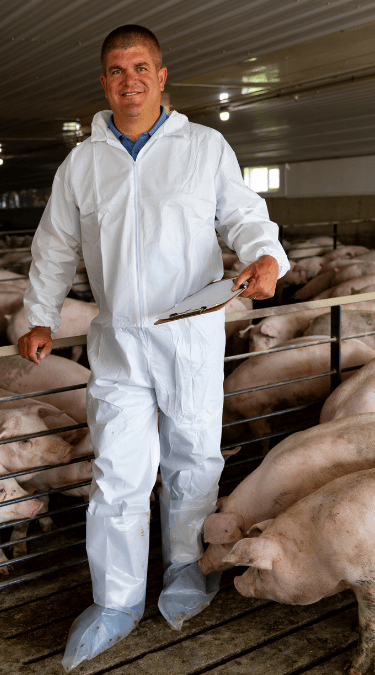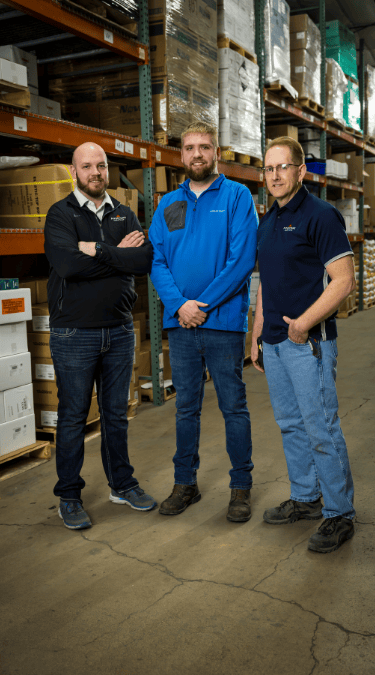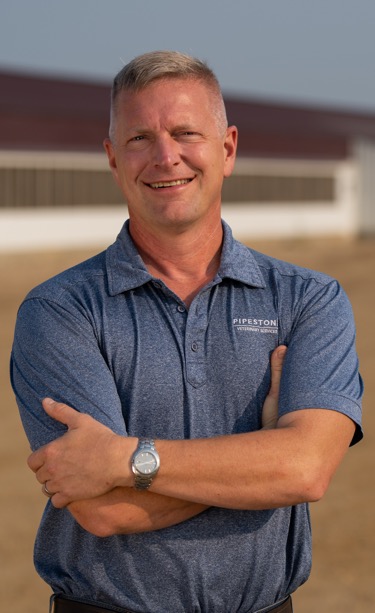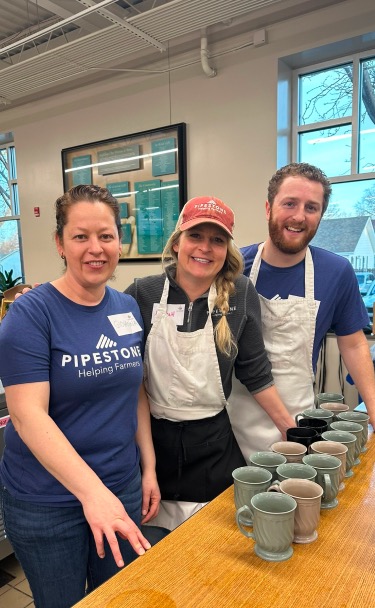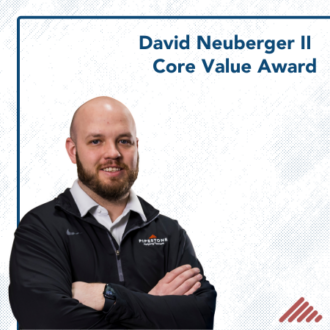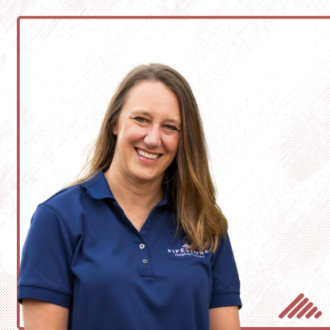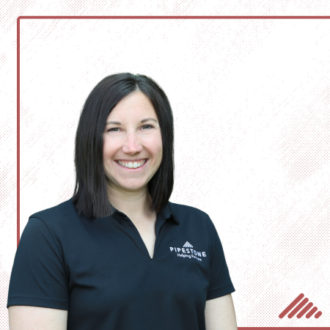
Though Dr. Bryan Myers (Doc) didn’t grow up on a farm, livestock were part of his life from a young age. “Most of my relatives lived on farms,” he says, “so from about age five or six, I spent a lot of time around animals.” Back then, farms were smaller and raised multiple species—dairy, beef, and swine.
Unlike many vets drawn to companion animals, Myers was inspired by livestock. “I became a veterinarian because I enjoyed being around livestock,” he explains. After earning his DVM in 1988, he worked in a mostly food-animal practice with dairy, beef, and swine.
The impact he could make at the herd level led him to focus on swine. “Improving feed efficiency or growth rates by a small margin sounds minor, but across thousands of pigs, it’s a big deal,” Myers says. His interest in population medicine and numbers pushed him further into swine health.
About five years into practice, Myers enrolled in the Executive Veterinary Program in Swine Health and Production at the University of Illinois. “That program changed how I approached herd health and working with producers,” he reflects.

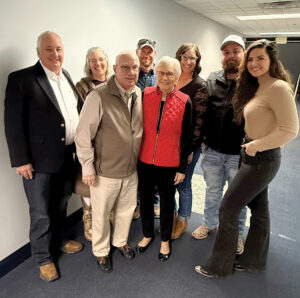
Adapting to Change
Dr. Myers has seen tremendous changes in the pig industry since he started practicing. “The size of farms has grown. The way we raise pigs has changed dramatically,” he said. “But one of the biggest changes is in expectations—from consumers, from regulators, even from ourselves.”
Where he once worked with about 400 small farrow-to-finish farms averaging 40 to 400 sows each, that number has dwindled to roughly 2 sow farms in the same geographical footprint, though overall pig numbers are larger.
Along with changes in scale and expectations, producers now face more pressure to prove their practices through audits and documentation—layers that weren’t part of the industry years ago.
Advances in technology have transformed herd health management. “We have more tools now. We can monitor things more precisely, respond faster, and make better decisions with data,” Dr. Myers explains. “But at the end of the day, it still comes down to stockmanship and good husbandry.”
Lead with Relationships
Dr. Bryan Myers’ path to Pipestone didn’t begin with a job posting or a career plan—it started with people.
“Long before I joined Pipestone, I was already working with some producers who were shareholders in sow farms managed by Pipestone,” he said.
Through those shared clients, Dr. Myers developed a professional relationship—and eventually a friendship—with Dr. Cameron Schmitt, who was providing veterinary care to those farms. When Dr. Schmitt moved to Independence, Iowa, the timing aligned. The connection and mutual respect were already there.
“Joining the team at Pipestone wasn’t something I had necessarily planned,” Myers said. “But the relationships made it feel like the right move.”
That sense of trust, mutual respect, and shared purpose laid the foundation for his transition—and reflects the very approach Myers has taken throughout his veterinary career: lead with relationships, and the rest will follow.
“One of the things I’ve tried to do over the years is help younger vets get better,” he said. “I’ve been fortunate to have some really good mentors in my own life. I try to do the same.” Whether he’s walking pens, helping producers navigate tough decisions, or talking a young vet through a difficult case, his approach is consistent: be present, be honest, and keep learning. “I still learn something every day,” he said. “This job keeps you humble.” He also encourages younger vets to embrace what they don’t know. “It’s OK to say, ‘I don’t know,’” he said. “The key is working your tail off to find the answer—and following up.”
Over time, his quiet presence has shaped not only practices, but people. “In the last few years, I’ve heard younger vets say, ‘That’s the way Myers taught me,’ or, ‘That’s the way Doc does it.’ Sometimes that’s not the right way,” he added with a chuckle, “but it’s what I showed them.”
Those same younger vets often sharpen his thinking in return. “They’ll ask why I do something, and I have to stop and think, ‘I’ve been doing it that way for 35 years.’ And sometimes I realize, ‘That actually does make more sense.’”
Though he never set out to build a legacy, Dr. Myers has cultivated a culture of growth and humility—where both seasoned vets and newcomers feel supported, challenged, and better because of the example he sets.
Rooted in Trust and Service
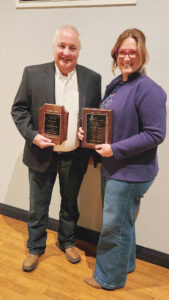
Across his 37-plus years in veterinary medicine, Dr. Bryan Myers has always put people first—especially the farmers he serves.
“What I’ve enjoyed most is working with people,” he said. “I’ve always really liked the people that raise pigs. They’re good folks. They work hard. They try to do the right thing.”
That respect drives his approach: listen first, then help. “It’s really important to understand what a producer wants—what they’re trying to accomplish. You have to listen before you start talking.”
Over time, that philosophy has earned him the trust of generations of pig farmers across the Midwest. He’s not just a veterinarian who shows up when there’s a problem—he’s a consistent presence, a trusted advisor, and a steady hand through both challenges and progress.
He lights up when talking about the people in agriculture. “You go to meetings and someone says, ‘I’m just a pig farmer.’ I’m like—no, you feed the world. What’s more honorable than that?”
For Dr. Myers, recognition has never been the goal. “I never thought I did anything spectacular or different than anybody else,” he said. “I just went out every day and did what I thought was right.”
In 2025, that quiet dedication was recognized when he was named Swine Practitioner of the Year by the American Association of Swine Veterinarians (AASV)—a meaningful honor from his peers.
“Awards are great,” he said, “but honestly, seeing my clients succeed, expand, be profitable—that’s what really matters.”
Even after decades, he still finds pride—and humor—in his work. “Somebody asked me once what I did today. I said, ‘Just another day stamping out disease and pestilence, keeping the food supply safe for all mankind,’” he said with a laugh. “We joke about it, but it’s true. Whether you’re the vet, the sow farm manager, the power washer, or the guy giving shots—you’re all part of feeding people. Be proud of that.”
